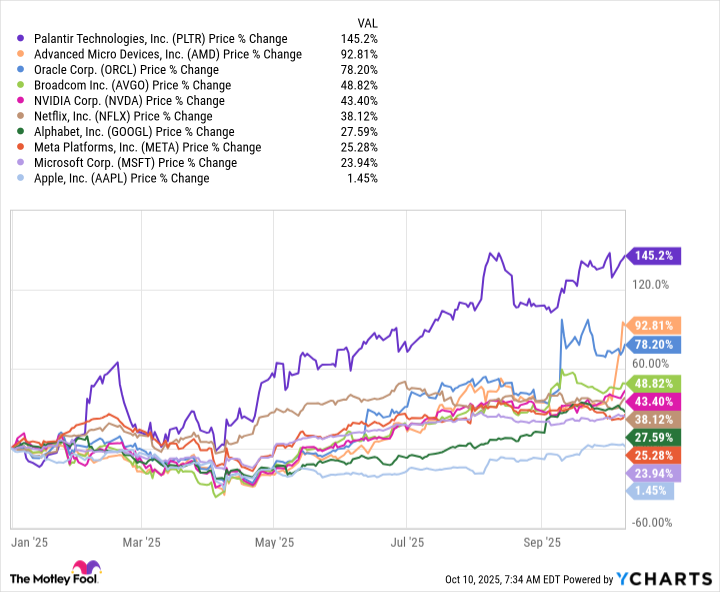BlackRock is the world's largest investment manager, with a whopping $12.5 trillion in client assets in its custody. Around $3.3 trillion of that sum is parked in exchange-traded funds (ETFs) operated by its iShares subsidiary.
ETFs can be constructed to track the performance of stock indexes or to give investors exposure to specific segments of the market like technology. Currently, iShares offers more than 1,400 ETFs, and one of them is the iShares Expanded Tech Sector ETF (IGM +0.83%).
This ETF holds a portfolio of 280 technology stocks, and it outperformed the benchmark S&P 500 every year since it was established in 2001. Here's why I predict it will crush the index again in 2026.

Image source: Getty Images.
A concentrated portfolio of America's most dominant technology stocks
The iShares Expanded Tech Sector ETF invests in American companies operating in the technology sector, but it also backs technology-related companies from the communication services and consumer discretionary sectors. Those companies sell everything from hardware to software to marketing services, giving investors diversified exposure to the tech space.
Despite holding 280 stocks, the top 10 positions in the iShares ETF account for 56.9% of the value of its portfolio. Therefore, its performance is highly dependent on a select few names, but most of them are serious players in the booming artificial intelligence (AI) space.
|
Stock |
iShares ETF Portfolio Weighting |
|---|---|
|
1. Apple |
9.13% |
|
2. Nvidia |
8.56% |
|
3. Microsoft |
8.42% |
|
4. Alphabet |
8.21% |
|
5. Broadcom |
7.50% |
|
6. Meta Platforms |
4.06% |
|
7. Netflix |
3.17% |
|
8. Oracle |
2.94% |
|
9. Palantir Technologies |
2.57% |
|
10. Advanced Micro Devices |
2.35% |
Data source: iShares. Portfolio weightings are accurate as of Oct. 8, 2025, and are subject to change.
Those 10 stocks have delivered a median return of around 40% this year, carrying the iShares ETF to a gain of 27%. The S&P 500, on the other hand, is up just 15%.
Nvidia, Broadcom, and AMD are three of the world's top suppliers of the data center chips and components that are central to the AI revolution. Nvidia's Blackwell Ultra graphics processing units (GPUs) lead the way in terms of performance, but the hardware designed by Broadcom and AMD isn't far behind, and many tech giants are now sourcing chips from all three companies.
Microsoft, Alphabet, and Oracle are among the biggest buyers of AI data center hardware. They are service providers, meaning they rent computing capacity and other tools to businesses to help them deploy AI software, and each of them is experiencing more demand than they can possibly supply right now.
Meta Platforms uses AI in the content and advertising recommendation engines on Facebook and Instagram to tailor each user's feed to their individual preferences, which boosts engagement. Then there is Palantir, which developed a portfolio of AI-powered software platforms to help organizations extract value from their growing piles of data.
Outside of its top 10 holdings, the iShares ETF holds a number of other prominent AI stocks including Salesforce, Micron Technology, Palo Alto Networks, CrowdStrike, Snowflake, and more.

NYSEMKT: IGM
Key Data Points
The iShares ETF could beat the S&P 500 again in 2026
The iShares Expanded Tech Sector ETF delivered a compound annual return of 11.6% since it was established in 2001, comfortably outperforming the S&P 500, which climbed by an average of 8.5% per year over the same period.
However, the ETF generated an accelerated annual return of 22.9% over the past decade, thanks to the proliferation of technologies like cloud computing and AI. That represents an even wider performance gap to the S&P 500, which grew by 13.4% annually over the last 10 years. The magic of compounding makes the difference even greater in dollar terms:
|
Initial Investment (2015) |
Compound Annual Return |
Balance in 2025 |
|---|---|---|
|
$50,000 |
22.9% (iShares ETF) |
$393,087 |
|
$50,000 |
13.4% (S&P 500) |
$175,833 |
Data source: Calculations by author.
It's unrealistic to expect the iShares ETF to deliver annual returns of over 20% forever, especially since some of its largest holdings operate very mature businesses. There are more than 2.35 billion active Apple devices worldwide, for example, and nearly 3.5 billion people use one of Meta's social media apps every day. Without a substantial increase in the global population, it will become increasingly difficult for those companies to grow.
But the AI boom can certainly drive the ETF to above-average returns for the next few years at least. Nvidia CEO Jensen Huang predicts data center operators will spend $4 trillion upgrading their infrastructure to meet demand from AI developers over the next five years, which will be a massive tailwind for all hardware suppliers.
Moreover, Cathie Wood's Ark Investment Management thinks AI will create a staggering $13 trillion opportunity in the software space over the same period.
As a result, based on its track record and the sizable opportunities ahead, I think the iShares ETF has a great chance to crush the S&P 500 again in 2026. However, investors should buy it as part of a diversified portfolio of other funds and individual stocks to limit any potential downside if the AI boom unexpectedly falters.






